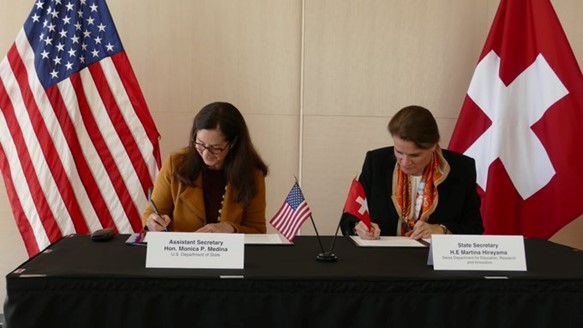
(October 19, 2022) Today, the United States and Switzerland signed a Joint Statement on Cooperation in Quantum Information Science and Technology (QIST) at the Embassy of Switzerland in Washington, DC. The statement builds upon the nations’ shared democratic values and the strong bottom-up collaborations that exist between QIST researchers from the two countries. U.S.-Switzerland diplomatic relations began in 1853 following the formation of a unified Swiss state. Since then, various agreements have strengthened U.S.-Swiss relations, including a 2009 Science and Technology Agreement. Recently, heads of quantum strategy from the two nations came together for a twelve-nation roundtable on pursuing quantum information together.
Monica P. Medina, Assistant Secretary of State for the Bureau of Oceans and International Environmental and Scientific Affairs, signed the joint statement for the United States. “With this signing and declaration, the United States and Switzerland are recommitting ourselves to the promise of quantum information science, where international collaboration is key for progress,” said Medina. “We intend to strengthen bonds between our two nations to advance quantum information science and benefit from its immense potential.”
Martina Hirayama, State Secretary for Education, Research, and Innovation, signed the joint statement for Switzerland. “The Joint Statement signed today brings two strong partners even closer together,” said Hirayama. “Both Switzerland and the USA occupy top positions in QIST research and development. In summary, this Joint Statement further strengthens Switzerland’s research and innovation landscape by expanding bilateral cooperation with strong partners all over the world.”
QIST has the potential to revolutionize many areas of science and technology through the creation of quantum computers that outperform traditional computers at certain tasks, quantum networks for transmitting and distributing quantum information, and ultra-sensitive quantum sensors. The United States has been investing in QIST since the early 1990’s, and the 2018 National Quantum Initiative led to the creation of 13 QIST centers at universities, national laboratories, and government laboratories to carry out research and development. The initiative also created an industry-led quantum consortium, the National Q-12 Education Partnership to develop the next-generation quantum workforce, and a committee of QIST experts to advise the President and Congress.
Switzerland’s investments in QIST span more than two decades, with the launch of the National Center of Competence in Research (NCCR) on Nanoscale Science, the NCCR on Quantum Photonics in 2001, the NCCR on Quantum Science and Technology in 2010, and the NCCR on Qubits in Silicon Spin in 2020. In May 2022, the Swiss federal government launched a National Initiative on Quantum, which complements the significant investments made by Swiss universities and institutions. On the sidelines of the signing of the Joint Statement, Swissnex is co-organizing the first edition of the “Swiss-US Quantum Days” meeting in Chicago.
Charles Tahan, the Assistant Director for Quantum Information Science at the White House Office of Science and Technology Policy, and Director of the National Quantum Coordination Office, said, “Today’s quantum cooperation statement recognizes the importance of U.S.-Swiss collaborations in accelerating QIST research and development, and it constitutes an important step in developing a trusted global network for this critical emerging technology that advances computing, networking, and sensing for the benefit of society.”
Jacques Pitteloud, Ambassador of Switzerland to the United States, said “The strong scientific ties between Switzerland and the United States take on a new dimension with the signing of a Joint Statement on Quantum Cooperation and demonstrates the willingness of both countries to address key challenges of this century by advancing the promising possibilities of QIST.”
The Joint Statement advances both countries’ agendas to engage in good-faith cooperation in QIST, promote integrity in research, create respectful and inclusive scientific research communities, and build a trusted market and supply chain.

